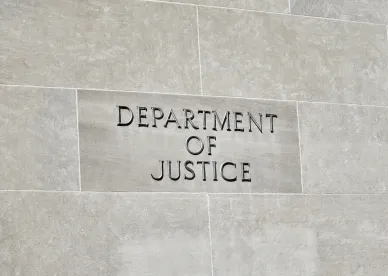The ability for private and government defendants to agree to Supplemental Environmental Projects (“SEPs”) in enforcement actions as a means to offset penalties continues to be in flux based on a recent legal challenge. In the past, SEPs have been used as a negotiation tool for federal governmental agencies to reach settlement with alleged violators. SEPs offer a benefit to areas experiencing pollution, especially areas with environmental justice concerns. As background, in March of this year, Assistant Attorney General Jeffrey Bossert Clark (“AAG Clark”), of the Environment and Natural Resource Division of the United States Department of Justice (“DOJ”) issued a memo that effectively terminates the use of SEPs as part of the terms for private parties’ settlements with the federal government. Prior to the March 2020 Clark Memo and an earlier August 2019 prohibition affecting state and local governments, DOJ and the U.S. Environmental Protection Agency (“EPA”) made wide use of SEPs for decades because they provided a means for an alleged violator of an environmental statute to address the effects of pollution or forestall future pollution through tangible, real-world projects in locations different from where the alleged violation at issue occurred. In response, a lawsuit was filed last week seeking injunctive relief from the edict. The suit, filed by the Conservation Law Foundation (“CLF”) in the District Court for the District of Massachusetts, claims that the March 2020 Clark Memo, and the resulting decision to terminate the long standing practice of using SEPs, violates the Administrative Procedures Act (“APA”) in that its conclusion that SEPs violate the Miscellaneous Receipts Act , 31 U.S.C. § 3302, (“MRA” or “Act”) is arbitrary, capricious, an abuse of discretion, and not in accordance with the law as outlined in the policies and previous legal opinions of DOJ and EPA.
Background
The CLF dispute revolves around the MRA which requires that any federal officer receiving funds on behalf of the United States must deposit those funds at the U.S. Treasury. For decades, there have been questions surrounding the Act and the effect it has on consent decrees especially as it relates to SEPs. However, DOJ’s Office of Legal Counsel has repeatedly opined that SEPs do not violate the MRA when agencies do not retain control over the post-settlement funds and SEPs are not funded with money otherwise obligated to the U.S. Treasury. As a result, since the 1980s, alleged violators of federal environmental statutes have settled civil enforcement actions by entering consent decrees that included SEPs. Furthermore, in its 2015 Guidance, the EPA asserted that it has broad discretion to settle cases and that discretion extends to the inclusion of SEPs as an appropriate part of case resolution. The EPA also set out legal guidelines to ensure that SEPs are within the authority of the Agency and the federal courts, and do not violate the Constitution or any statutory requirements. The primary pillars of the EPA guidelines are that: (1) SEPs are entirely independent from monies paid to the U. S. Treasury, and (2) SEPs are independent from monies already appropriated from the U. S. Treasury. While SEPs are viewed as a win-win for all parties involved, regulatory requirements still require some sort of monetary penalty be paid to the federal government.
The March 2020 Clark Memo
Citing his authority both “(1) to construe the governing sources of law as a necessary part of ensuring any and all enforcement actions he authorizes and every position taken in court in cases that he supervises comport to the law; and (2) to exercise appropriate prosecutorial discretion regarding both civil and criminal enforcement cases,” on March 12, 2020, AAG Clark removed SEPs from the suite of relief available to DOJ/EPA in enforcement actions against both governments and private parties because SEPs are inconsistent with law and depart from sound enforcement practices.
Given that undertaking a SEP can result in direct penalty mitigation of a maximum of 80% of the total penalty, the March 2020 Clark Memo, determined that this reduction represents a “conversion rate” for SEPs into civil penalties, and therefore, “the conclusion is inescapable that SEPs violate the Miscellaneous Receipts Act.” Furthermore, the agreement to undertake a SEP in exchange for a reduction of a penalty “[is] as problematic as direct cash payments to third parties.” Additionally, AAG Clark stated that SEPs violate the “spirit” of the MRA, which he claims is intended to protect Congress’ constitutional power of the purse. The March 2020 Clark Memo also clarifies that AAG Clark does not have the discretion to make exceptions to what is a sound construction of both statutory and constitutional law.
However, the March 2020 Clark Memo is not the first time that AAG Clark expressed concerns about SEPs. AAG Clark also drafted an August 21, 2019 memorandum (“August 2019 Memo”) following a November 2018 announcement from then Attorney General Jeff Sessions regarding a new policy (“Sessions Policy”) governing consent decrees and settlement agreements with state and local governments. The Sessions Policy stated that these agreements “must not be used to achieve general policy goals or to extract greater or different relief from the defendant than could be obtained through agency enforcement authority or by litigating the matter to judgment.” Arguing that SEPs, by their nature, go beyond what is required by federal, state or local laws, the August 2019 Memo, ultimately finds that SEPs involving state and local government defendants fall within the core of the Sessions Policy, and are precluded, absent the granting of an exception based on other considerations. In reaching this conclusion, AAG Clark rejected the argument that SEPs should be categorically exempted from the new Sessions Policy because Congress allegedly (and implicitly) approved of their use in America’s Water Infrastructure Act of 2018, P.L. 115-270, 132 Stat. 3765, which amended the Clean Water Act (“CWA”) to authorize municipalities operating sewer and stormwater systems to undertake an integrated planning process to streamline CWA compliance obligations. Furthermore, the August 2019 Memo also rejected the argument that the new policy itself excludes SEPs from its substantive requirements because EPA will agree to them in its non-judicial administrative settlements.
The Challenge
CLF challenges the March 2020 Clark Memo, stating that it is based on AAG Clark’s conclusion that SEPs violate the MRA, despite previous unrevoked federal agency policies. CLF begins their argument by laying out the longstanding approval that DOJ and other federal agencies have expressed regarding the inclusion of SEPs in consent decrees and settlement agreements. Furthermore, according to the Plaintiff, most enforcement actions the EPA refers to the DOJ are resolved through settlement agreements or consent decrees.
CLF goes on to challenge AAG Clark’s reading of the MRA, stating that the Act requires that “an official or agent of the Government receiving money for the Government from any source shall deposit the money in the Treasury as soon as practicable without deduction for any charge or claim.” 31 U.S.C. § 3302(b) (emphasis added). In response to AAG Clark’s statement regarding the conversion rate creating an inescapable conclusion that SEPs must violate the Act, CLF argues that since settlements including a SEP must always include a settlement penalty that recoups the economic benefit a violator gained from noncompliance, this argument is unfounded.
Ultimately, the Plaintiff claims that the March 2020 Clark Memo violates the APA, asserting that AAG Clark’s conclusion that SEPs violate the Act is arbitrary, capricious, an abuse of discretion, and not in accordance with the law. In the March 2020 Clark Memo, AAG Clark states that even if SEPs do not violate the actual text of the MRA, SEPs go against the “spirit” of the Act. Plaintiff claims that this argument distorts that statute, EPA’s 2015 Guidance, and DOJ’s understanding of constructive receipt. CLF also claims that the remainder of the March 2020 Clark Memo is arbitrary and capricious because the analysis lacks reasoned decision-making.
Plaintiff asks that the Court declare that the March 2020 Clark Memo violates the APA and is unlawful and, therefore, requests that it be vacated. Additionally, Plaintiff also seeks to enjoin the Defendants from implementing or further relying on the March 2020 Clark Memo in any way.
Looking Forward
The next step in this case requires the Defendants to file an answer to CLF’s complaint within 21 days of receipt of the summons. The most important question in this case will be whether the March 2020 Clark Memo constitutes a final agency action. This question is a complex one, but some courts have provided guidance. In NRDC v. Jorjani, No. 18-cv-4596 (S.D.N.Y. July 31, 2019), the Court found that the Department of Interior’s (“DOI”) memo reversing its own interpretation of the Migratory Bird Treaty Act was a final agency action because it “represented the consummation of the agency’s decision-making process” and had “direct and appreciable” legal consequences. In contrast, in Calif. Comm. Against Toxics v. EPA, No. 18-1085 (D.C. Cir. Aug. 20, 2019), the Court found that an EPA guidance memo reversing its “once in, always in” regulation of sources of hazardous air pollutants, was not a final agency action, noting that while the EPA’s memo “represented the consummation of the agency’s decision-making process,” it did not have “direct and appreciable legal consequences.”
It is important to keep in mind that while this litigation centers around the federal government’s abilities to include SEPs in consent decrees or settlement agreements with local and state governments as well as private parties, it does not in any way affect a state’s ability to include SEPs in agreements it may reach with the regulated community. Each state may have its own guidelines regarding SEPs. Some states even have different SEP procedures and policies for various departments within their state environmental protection agencies. For example, California’s Air Resources Board, CalRecycle, Department of Pesticide Regulation, Department of Toxic Substances Control, and Water Boards all have their own policies for handling SEPs. New York even has their own penalty calculations for their state SEP equivalents, referred to as Environmental Benefit Projects (“EBPs”), where 85% of the expected cost of implementing the EBP can be suspended from the assessed penalty. Additionally, states may have priority areas they are seeking to revitalize. Identifying these areas, or even a specific project, could aid in any negotiations with that state.





 />i
/>i

